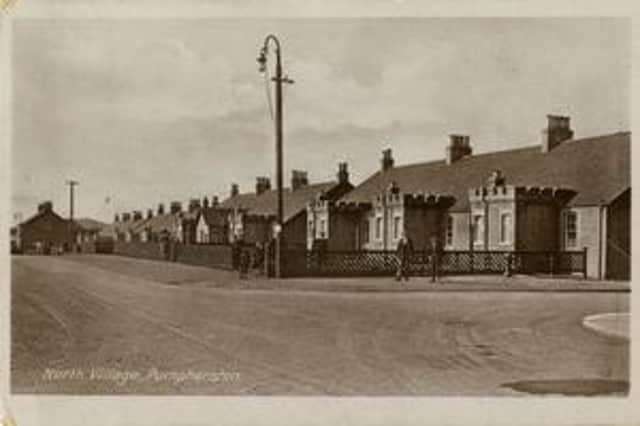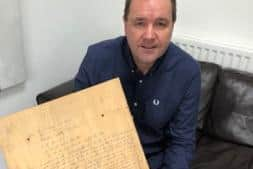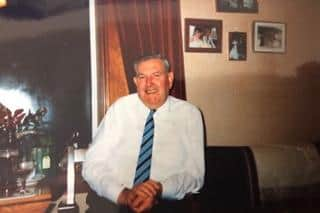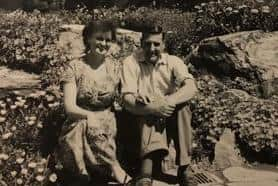Memoirs of MSP's grandfather offer fascinating glimpse of life at the heart of West Lothian shale oil community last century


The current occupant of the house presented him with the end panel they had taken off when replacing the bath - and on the back, Jock Findlay had written his life story.
"It had been hidden there deliberately since 1978 and it was brilliant to read,” said Mr Findlay. “That led me to go and look for a wee notebook which was the one possession I got when my granny went into sheltered housing and the house got broken up. In that was the extended life story my granda’ had written.”
Advertisement
Hide AdAdvertisement
Hide AdNow Mr Findlay is publishing his grandfather's memoirs, revealing the details of day-to-day life at the heart of West Lothian's shale oil industry in the middle of last century.


John “Jock” Findlay was born in 1915, the youngest of a family of six. He went to school in Pumpherston and served an apprenticeship as plumber and lead burner with the Pumpherston Oil Company. He married Helen ‘Lena’ Johnston and the couple had twin boys.
After the Second World War he spent time working in the Middle East in the newly developing oil industry. Not long after he returned he lost his leg in motorbike accident, but was determined to carry on working.
The book, Life in the Raws – referring to the rows of houses built by the Pumpherston Oil Company for its workers – includes a brief account of how shale oil – “Scotland’s first oil boom” – flourished from the 1850s when James ‘Paraffin’ Young built the world's first mineral oil works at Boghead near Bathgate until the last Scottish shale oil work closed in 1962.
Advertisement
Hide AdAdvertisement
Hide AdIn the book Jock Findlay recalls: “In 1929 wages at the work were as follows: 36 shillings a week for a labourer and £2.50 for a tradesman. My wage when I started in the plumbers shop was 11 shillings and fourpence. The working day was 6.20am until 9.00am, breakfast from 9.00am until 9.40 am. Then work again until dinner, from 1.00pm to 1.30pm, finishing at 4.00pm. You worked these hours Monday to Friday and until 1.00pm on a Saturday. All in all a 48 hour week..


“The oil company owned most of the houses in the village apart from around 24 that were owned by the Co-op and ten that were privately owned and rented out. Renting a house from the workhouse cost 1 shilling and sixpence a week for a two-room house and 1 shilling per week for a one room house.
“The work was run by the manager director Mr Bryson. Not only did he run the oil works, he ran the entire village and did so with a rod of iron. If you stepped out of line then you could safely bet that the following day your father would be called into the works’ office to account for your actions. And God help any man who came home drunk on a Saturday night and disturbed the peace of the village. This type of behaviour would result in a severe reprimand at the works’ office on the Monday morning.”
He describes Sundays as “a big family day” when he had to wear “my suit and best clothes and shiny shoes” and there would be a family walk along the banks of the River Almond and home along the railway line that went from Uphall to East Calder.
Advertisement
Hide AdAdvertisement
Hide Ad"Sundays were peaceful days for the village. I was told by my parents not to whistle or play the gramophone.” But he adds: “Our family were not great church people and damned few in village were. The villagers were more manager-fearing than God-fearing.”


There was a strike in 1921, lockouts in 1924 and the General Strike in 1926. Soup kitchens were set up to feed the children of the men on strike.
"The Pumpherston soup kitchen was in the school and was used mainly by larger families, some of whom had up to 12 children. These big families were raised in room and kitchen houses with only three bed recesses. There was no such thing as bathrooms or central heating. In those days the only heat came from the open fire and on this all cooking was done.
"If we were in need of a bath we went to the wooden washhouse at the rear of the house and filled the bathtub from the wash boiler after the clothes washing was finished. When it was washday four tenants shared the washhouse. Each tenant had their allocated washday. My mother used to do washing for the local farm owner and the labourers at the work and was paid two and six a week – today’s equivalent of 15 pence. There were no washing machines, of course, all of the clothes had to be scrubbed on a wash board with metal ribs.”
Advertisement
Hide AdAdvertisement
Hide AdJock recalls an Italian ice cream seller called Angelo with a wooden barrow like a miniature farm cart. “On the barrow he had a handmade sink container, kept cool by sawdust. This kept the ice cream from melting. He pushed that heavy barrow up and down the braes between Mid Calder, Pumpherston, East Calder, Oakbank and all the way over to Broxburn all for a few pennies profit..”
There are also memories of gala days – “the highlight of the year” – a visiting cinema, solemn funerals which affected the whole village and countless stories of the area’s characters.
The book will be published on Monday , but it can be ordered now from neilfindlaybooks.com.
A message from the Editor:
Thank you for reading this article. We're more reliant on your support than ever as the shift in consumer habits brought about by coronavirus impacts our advertisers.
If you haven't already, please consider supporting our trusted, fact-checked journalism by taking out a digital subscription.
Comment Guidelines
National World encourages reader discussion on our stories. User feedback, insights and back-and-forth exchanges add a rich layer of context to reporting. Please review our Community Guidelines before commenting.